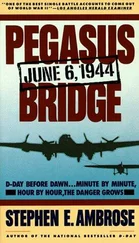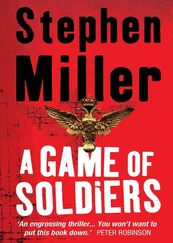Stephen Ambrose - Citizen Soldiers [Condensed]
Здесь есть возможность читать онлайн «Stephen Ambrose - Citizen Soldiers [Condensed]» весь текст электронной книги совершенно бесплатно (целиком полную версию без сокращений). В некоторых случаях можно слушать аудио, скачать через торрент в формате fb2 и присутствует краткое содержание. Жанр: История, на английском языке. Описание произведения, (предисловие) а так же отзывы посетителей доступны на портале библиотеки ЛибКат.
- Название:Citizen Soldiers [Condensed]
- Автор:
- Жанр:
- Год:неизвестен
- ISBN:нет данных
- Рейтинг книги:5 / 5. Голосов: 1
-
Избранное:Добавить в избранное
- Отзывы:
-
Ваша оценка:
- 100
- 1
- 2
- 3
- 4
- 5
Citizen Soldiers [Condensed]: краткое содержание, описание и аннотация
Предлагаем к чтению аннотацию, описание, краткое содержание или предисловие (зависит от того, что написал сам автор книги «Citizen Soldiers [Condensed]»). Если вы не нашли необходимую информацию о книге — напишите в комментариях, мы постараемся отыскать её.
Citizen Soldiers [Condensed] — читать онлайн бесплатно полную книгу (весь текст) целиком
Ниже представлен текст книги, разбитый по страницам. Система сохранения места последней прочитанной страницы, позволяет с удобством читать онлайн бесплатно книгу «Citizen Soldiers [Condensed]», без необходимости каждый раз заново искать на чём Вы остановились. Поставьте закладку, и сможете в любой момент перейти на страницу, на которой закончили чтение.
Интервал:
Закладка:
The enemies commenced firing at each other. Both missed. Both ran out of ammunition at precisely the same time. Masters knelt on one knee, reloaded, as did the German. The enemies looked up at the same time and fired simultaneously. Masters put a bullet between the machine gunner's eyes. When Masters took off his helmet to wipe his brow, he found a bullet hole through the top.
Masters ran to the first building on the outskirts of town. "I had this dead-end kid from Chicago I'd made my bodyguard. He came in close behind me, and then a number of men pulled up and we went from building to building cleaning out the place and captured a sizable batch of German paratroopers." Lieutenant Paul Leimkuehler gave a more vivid description of Masters's action: "He was leading, running down the main street like a madman, shooting up everything in his way."
The company advanced and by March 7 was in Krefeld, on the banks of the Rhine. By some miracle the men found an undamaged high-rise apartment building in which everything worked-electricity, hot water, flush toilets, telephones. They had their first hot baths in four months. They found cigars and bottles of cognac. Private Bocarski, fluent in German, lit up, sat down in an easy chair, got a befuddled German operator on the phone, and talked his way through to a military headquarters in Berlin. He told the German officer he could expect K Company within the week.
That was not to be. Having reached the river, K Company, along with the rest of Ninth Army, would stay in place until Montgomery had everything ready for Operation Plunder.
ON MARCH 7 Patton's forces were still fighting west of the Rhine, trying to close to the river from Koblenz south to Mainz. The best stretch of river for crossing south of Cologne was in his sector. He was thinking of crossing on the run and hoping he could do it before Montgomery's operation even got started-and before Hodges's First Army. too, if possible.
But his men were exhausted. "Signs of the prolonged strain had begun to appear," one regimental history explained. "Slower reactions in the individual, a marked increase in cases of battle fatigue, and a lower standard of battle efficiency all showed quite clearly that the limit was fast approaching." Company G, 328th Infantry Regiment, was typical. It consisted of veterans whose bone weariness was so deep they were indifferent, plus raw recruits. Still, it had the necessary handful of leaders, as demonstrated by Lieutenant Lee Otts in the second week in March, during Third Army's drive towards the Rhine. Private George Idelson described it in a 1988 letter to Otts: "My last memory of you-and it is a vivid one-is of you standing in a fierce mortar and artillery barrage, totally without protection, calling in enemy coordinates. I know what guts it took to do that. I can still hear those damn things exploding in the trees."
Otts established a platoon CP and started to dig a foxhole. "Mortar shells started falling almost as thick as rain drops," he remembered. "Instead of covering my head, I, like a fool, propped up on my right elbow with my chin resting on my hand, looking around to see what was going on. All of a sudden something hit me on the left side of my jaw that felt like a blow from Jack Dempsey's right. I stuck my hand up to feel the wound and it felt as though half my face was missing." The company commander came limping over. He had been hit in the foot and intended to turn the company over to Otts, but he took one look at Otts's face and cried, "My God, no, not you too," and limped back to his foxhole.
Otts got up to start walking back to the aid station, when a sniper got him in the shoulder, the bullet exiting from his back without hitting any bone. He was on his way home. For the others the pounding continued. Lieutenant Jack Hargrove recalled: "All day men were cracking mentally and I kept dashing around to them but it didn't help. I had to send approximately fifteen back to the rear, crying. Then two squad leaders cracked, one of them badly."
FIRST Army was moving east all along its front, making ten miles per day, sometimes more. They were taking big bags of prisoners. They were looking forward to getting to the river, where they anticipated good billets in warm, dry cellars and a few days to rest and refit. There was even a chance they could stay longer, as there were no plans for crossing in their sector. First Army was, in essence, SHAEF's reserve. Eisenhower counted on it to give him the flexibility to send a number of divisions either north to reinforce Monty or south to reinforce Patton, depending on developments.
Early on March 7, on First Army's right flank, 9th Armoured Division was sent to close to the west bank of the Rhine. The mission of Combat Command B (CCB) of the 9th, commanded by General William Hoge, was to occupy the west bank town of Remagen, where a great railroad bridge spanned the Rhine. It had been built in World War I and named after General Eric Ludendorff. On the east bank there was an escarpment, the Erpeler Ley. Virtually sheer, rising some 170 metres, it dominated the river valley. The train tracks followed a tunnel through the Erpeler Ley.
As CCB moved towards the Rhine, Lieutenant Harold Larsen flew ahead in a Piper Cub, looking for targets of opportunity. At around 1030 he was approaching Remagen, when he saw the Ludendorff Bridge, its massive superstructure intact, looming out in the fog and mists. Larsen radioed General Hoge, who immediately sent orders to the units nearest Remagen to take the bridge. They were the 27th Armoured Infantry Battalion and the 14th Tank Battalion. Hoge formed them into a task force under Lieutenant Colonel Leonard Engeman, who put Lieutenant Emmet "Jim" Burrows's infantry platoon in the lead. Brushing aside light opposition, Task Force Engeman reached a wood just west of Remagen a little before noon. Burrows emerged from the wood onto a cliff overlooking the Rhine. German soldiers were retreating across the Ludendorff Bridge.
Burrows called back to Lieutenant Karl Timmermann, 22 years old, who had just assumed command of Company A the previous day. A touch of irony: Timmermann had been born in Frankfurt am Main, less than 160 kilometres from Remagen. His father had been in the American occupation forces in 1919, had married a German girl, stayed in the country until 1923, when he returned to his native Nebraska with his wife and son. Timmermann had joined the army in 1940 and earned his bars at officer candidate school at Fort Benning.
Timmermann was told to get into the town with his infantry and tanks. As Timmermann set out, Hoge set off cross-country in a jeep to get to the scene, weighing the prospects of capturing the bridge. He had just received an order to proceed south on the west bank until he linked up with the left flank of Third Army. To go for the bridge he would have to disobey direct orders, risking a court-martial and disgrace.
At 1500 Hoge arrived. Timmermann, meanwhile, had fought through scattered resistance and by 1600 was approaching the bridge. Germans on the east bank were firing machine guns and antiaircraft guns at his company. His battalion commander. Major Murray Deevers, joined Timmermann. "Do you think you can get your company across that bridge?" he asked.
"Well, we can try it, sir," Timmermann replied.
"Go ahead."
"What if the bridge blows up in my face?" Timmermann asked. Deevers turned and walked away without a word. Timmermann called to his squad leaders, "All right, we're going across."
He could see German engineers working with plungers. A huge explosion sent a volcano of stone and earth erupting from the west end of the bridge. The Germans had detonated a charge that gouged a deep hole in the earthen causeway joining the road and the bridge platform. The crater made it impossible for vehicles to get onto the bridge-but not infantry.
Читать дальшеИнтервал:
Закладка:
Похожие книги на «Citizen Soldiers [Condensed]»
Представляем Вашему вниманию похожие книги на «Citizen Soldiers [Condensed]» списком для выбора. Мы отобрали схожую по названию и смыслу литературу в надежде предоставить читателям больше вариантов отыскать новые, интересные, ещё непрочитанные произведения.
Обсуждение, отзывы о книге «Citizen Soldiers [Condensed]» и просто собственные мнения читателей. Оставьте ваши комментарии, напишите, что Вы думаете о произведении, его смысле или главных героях. Укажите что конкретно понравилось, а что нет, и почему Вы так считаете.
![Stephen Ambrose Citizen Soldiers [Condensed] обложка книги](/books/346737/stephen-ambrose-citizen-soldiers-condensed-cover.webp)








